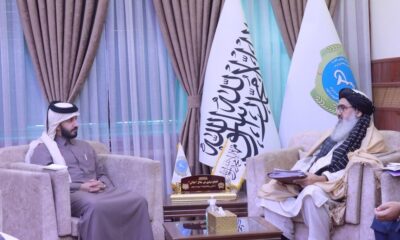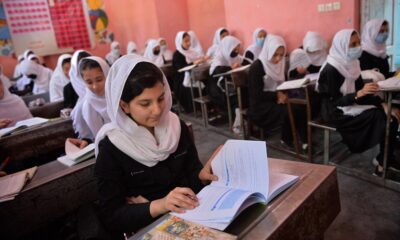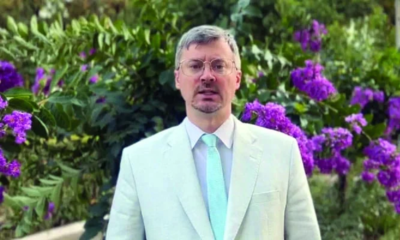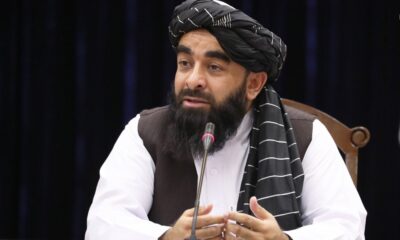World
Netanyahu says Israel will be a key US ally whoever replaces Biden
“In this time of war and uncertainty it’s important that Israel’s enemies know that America and Israel stand together today, tomorrow and always,” Netanyahu said.

Israel will be the United States’ strongest ally in the Middle East regardless of who is elected president in November, Prime Minister Benjamin Netanyahu said on Monday before flying to Washington, where he was due to address the U.S. Congress, Reuters reported.
The visit, Netanyahu’s first to his most important international ally since returning for a record sixth term as prime minister at the end of 2022, has been overshadowed by President Joe Biden’s decision not to seek reelection.
Netanyahu said he would thank Biden for all he has done for Israel throughout his career and discuss with him issues such as securing the release of Israeli hostages in Gaza, defeating the Palestinian Islamist group Hamas, and confronting Iran and its proxies in the region.
A meeting with Biden is tentatively planned for Tuesday if the 81-year old president has recovered from Covid-19. Netanyahu is scheduled to address Congress on Wednesday.
“I will tell my friends on both sides of the aisle that regardless who the American people choose as their next president, Israel remains America’s indispensable and strong ally in the Middle East,” he told reporters before taking off.
“In this time of war and uncertainty it’s important that Israel’s enemies know that America and Israel stand together today, tomorrow and always,” Netanyahu said, adding he wanted to “anchor the bipartisan support that is so important for Israel”.
After months of frosty relations with Washington over how Israel has conducted its offensive launched in Gaza after the Hamas-led attack on Oct. 7, the visit offers Netanyahu a platform to try to reset relations with Washington, read the report.
His speech to Congress is expected to focus on coordinating the Israeli and U.S. response to the volatile situation in the Middle East, where there is a growing danger of the Gaza war spilling over into a wider regional conflict.
The speech is likely to be less confrontational than an address Netanyahu gave to Congress in 2015, when he criticised Barack Obama’s drive as president for a nuclear deal with Iran.
U.S. pressure on Israel for a resumption of talks on reaching a political agreement with the Palestinians, and a U.S. threat to withhold arms, have underlined perceptions in Israel that ties with Washington have weakened under Netanyahu. He has also faced protests in Israel demanding a ceasefire in Gaza.
“Part of the goal is to try to show that with all that’s been said, with all the protests, Netanyahu is still the leader, still has support, he still has strong relations with America,” said Yonatan Freeman, an international relations specialist at the Hebrew University of Jerusalem.
The invitation for Netanyahu to address a joint meeting of Congress – a rare honour generally reserved for the closest U.S. allies – was orchestrated by the House of Representatives’ Republican leadership, which has accused Biden of not showing sufficient support for Israel.
There was no immediate sign that Netanyahu will see Republican presidential candidate Donald Trump. The two forged a close relationship during Trump’s presidency but Trump has since criticised Netanyahu and said the Gaza war must end quickly.
Although his welcome in Congress should be generally warm, protests roiling U.S. campuses suggest Netanyahu’s reception outside official Washington may be hostile.
Activists opposing Israel’s offensive in Gaza and Washington’s support for Israel plan protests at the U.S. Capitol on Wednesday. Police expect a “large number of demonstrators” and are making additional security arrangements but said there were no known threats, Reuters reported.
Israel has been isolated internationally over its campaign in Gaza, which Gaza health authorities say has killed almost 39,000 Palestinians, the expansion of settlement-building in the occupied West Bank and Jewish settlers’ attacks on Palestinians.
An opinion issued on Friday by the International Court of Justice that Israel’s occupation of Palestinian territories is illegal was criticised by Washington. But it followed similar developments including a decision by the International Criminal Court’s prosecutor to seek an arrest warrant against Netanyahu.
In Israel, Netanyahu faces growing calls for a deal that would halt the fighting in Gaza and allow the return of 120 hostages – alive or dead – still held in the enclave run by the Palestinian militant group Hamas.
Netanyahu has resisted pressure for an inquiry into the security failures before the Oct. 7 attack on Israel in which 1,200 people were killed and over 250 abducted into Gaza.
Opinion polls show most Israelis hold him responsible and would vote him out if elections were held, read the report.
Netanyahu will be accompanied by Noa Argamani, a hostage rescued by Israeli commandos last month. Her presence has been criticised by other hostage families who say Netanyahu has not been doing enough to secure the release of their loved ones.
World
Secretive Chinese network tries to lure fired US federal workers, research shows
Researcher identifies “network of fake consulting and headhunting firms”

A network of companies operated by a secretive Chinese tech firm has been trying to recruit recently laid-off U.S. government workers, according to job ads and a researcher who uncovered the campaign, Reuters reported Wednesday.
Max Lesser, a senior analyst on emerging threats with the Washington-based think tank Foundation for Defense of Democracies, said some companies placing recruitment ads were “part of a broader network of fake consulting and headhunting firms targeting former government employees and AI researchers.”
Little information is publicly available on the four consultancies and recruitment companies allegedly involved in the network, which in some cases shared overlapping websites, were hosted on the same server, or had other digital links, according to Reuters’ reporting and Lesser’s research.
The four companies’ websites are hosted at the same IP address alongside Smiao Intelligence, an internet services company whose website became unavailable during Reuters’ reporting.
Reuters could not determine the nature of the relationship between Smiao Intelligence and the four companies.
The news agency’s attempts to track down the four companies and Smiao Intelligence ran into numerous dead-ends including unanswered phone calls, phone numbers that no longer work, fake addresses, addresses that lead to empty fields, unanswered emails and deleted job listings from LinkedIn.
Lesser, who uncovered the network and shared his research with Reuters ahead of publication, said the campaign follows “well-established” techniques used by previous Chinese intelligence operations.
“What makes this activity significant,” he said, “is that the network seeks to exploit the financial vulnerabilities of former federal workers affected by recent mass layoffs.”
Reuters could not determine if the companies are linked to the Chinese government or whether any former federal workers were recruited.
Asked about the research, three intelligence analysts told Reuters the network appeared to be a prime example of how foreign-linked entities are trying to gather intelligence from staff fired or forced into retirement by President Donald Trump and billionaire tech tycoon Elon Musk’s Department of Government Efficiency.
A spokesperson for the Chinese Embassy in Washington told Reuters in an email that China was unaware of any of the entities allegedly involved in the campaign and Beijing respects data privacy and security.
A White House spokesperson said China was constantly trying to exploit the United States’ “free and open system” through espionage and coercion.
“Both active and former government employees must recognize the danger these governments pose and the importance of safeguarding government information,” the spokesperson said.
One of the companies in the network, RiverMerge Strategies, bills itself on its website as a “professional geopolitical risk consulting company” and posted two since-deleted job listings on its since-removed LinkedIn page in mid-February.
One ad that sought a “Geopolitical Consulting Advisor” with experience with government agencies, international organizations, or multinational corporations, displayed that it had more than 200 applications, according to a screenshot of the LinkedIn post.
The other sought a human resources specialist who could “utilize a deep understanding of the Washington talent pool to identify candidates with policy or consulting experience,” and “leverage connections to local professional networks, think tanks, and academic institutions.”
World
Russian missile attack wounds 88 in Ukraine’s Sumy, officials say
Zelenskiy said Russia was “the only entity prolonging this war and tormenting both our people and the entire world.
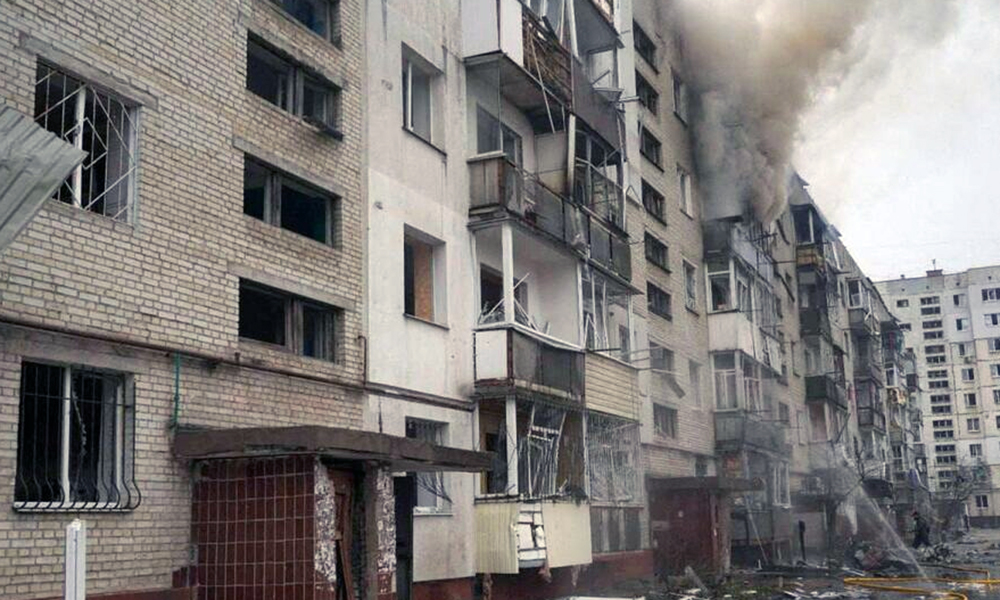
A Russian missile attack hit a densely-populated district of Ukraine’s northeastern city of Sumy, wounding 88 people, including 17 children, on Monday as ceasefire talks, ploughed on, officials said.
Regional governor Volodymyr Artiukh announced the latest casualty toll on national television. He said many more children had escaped injury as they had been evacuated to air raid shelters, Reuters reported.
“They were in the area in a densely-populated area hit by the enemy strike,” Artiukh told the television.
“Two schools fell within the impact zone. I was present when our rescuers cleared the locations where the children were. They were in protective structures. All the children were rescued and evacuated to a safe place.”
Several high-rise residential blocks in the city centre were also damaged, read the report.
Artiukh had earlier spoken in a video that he said was shot at the scene with heavy black smoke, fires and a car with shattered windows in the background. Smoke also rose from the upper floors of a five-storey residential block nearby.
Ukrainian President Volodymyr Zelenskiy deplored the attack in his nightly video address as the latest example of “losses, pain and destruction, something Ukraine never wanted.”
The missile struck the city as Russian and U.S. officials met in Saudi Arabia to discuss a possible ceasefire.
Zelenskiy said Russia was “the only entity prolonging this war and tormenting both our people and the entire world.
“To force Russia into peace, strong measures and decisive actions are needed,” he said. “We are ready to support every strong initiative that makes diplomacy more effective.”
Foreign Minister Adrii Sybiha said Moscow was speaking of peace “while carrying out brutal strikes on densely populated residential areas in major Ukrainian cities.”
“Instead of making hollow statements about peace, Russia must stop bombing our cities and end its war on civilians,” Sybiha said.
Acting Sumy mayor Artem Kobzar said on Telegram an industrial facility was attacked but did not name it.
Sumy, about 30 km (20 miles) from the Russian border, comes under constant drone and missile strikes from Russia.
World
Putin and Trump may have spoken more than twice, Kremlin says
Washington Post journalist Bob Woodward in his 2024 book “War” reported that Trump had direct conversations as many as seven times with Putin after he left the White House in 2021.
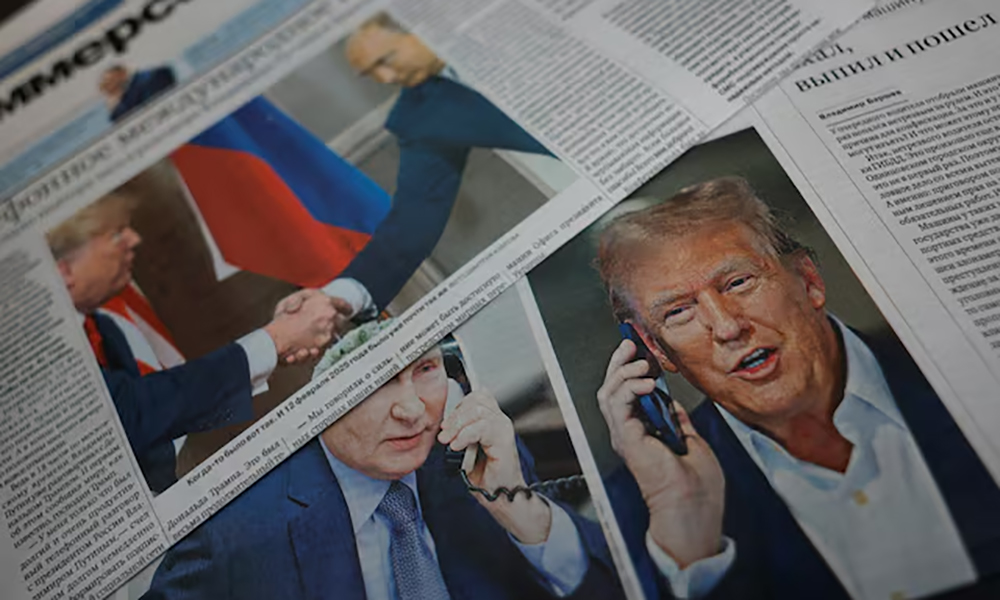
Russian President Vladimir Putin and U.S. President Donald Trump may have had more contacts than the two publicly announced telephone calls over recent months, the Kremlin said in video footage published by state television on Sunday.
Trump, who says he wants to be remembered as a peacemaker, has repeatedly said that he wants the three-year conflict in Ukraine to end and has warned of the risks of it escalating into a world war between the United States and Russia.
There have so far been two announced phone calls between Putin and Trump this year – on Feb. 12 and on March 18 – though there has been speculation about much more frequent contact, and also reports that they spoke before Trump was elected last year.
When asked by the most prominent Kremlin correspondent for state television about remarks by Trump that indicated there may have been more than two calls, Kremlin spokesman Dmitry Peskov said information had been released about those calls he knew of.
“Listen, we inform you about the conversations that we are aware of. But we can’t rule out everything else,” Peskov said.
State television’s Pavel Zarubin then asked: “So all sorts of nuances are possible as they say?” to which Peskov replied: “Well, that is how I would answer your question.”
The contacts between Trump and Putin have spooked European leaders who fear the United States could be turning its back on Europe in the hope of striking a peace deal with Russia as part of some broader grand bargain encompassing oil prices, the Middle East and competition with China.
Trump told the Washington Examiner, that he had been speaking to the Russian leader for weeks.
Before the contacts with Trump, Putin last spoke to a sitting U.S. president in February 2022, when he and Joe Biden spoke shortly before the Russian leader ordered tens of thousands of troops into Ukraine.
Washington Post journalist Bob Woodward in his 2024 book “War” reported that Trump had direct conversations as many as seven times with Putin after he left the White House in 2021.
Asked if that were true in an interview to Bloomberg last year, Trump said: “If I did, it’s a smart thing.” The Kremlin denied Woodward’s report.
Reuters, The Washington Post and Axios reported separately that Trump and Putin spoke in early November. The Kremlin also denied those reports.
Putin and Trump may have another phone call if Ukraine continues strikes on Russian energy infrastructure, Peskov said.
Putin agreed to the suspension of such attacks in a phone call with Trump last week. Kyiv, which has said it would be willing to take part in such a partial ceasefire if a document setting out its terms is agreed, has accused Russia of not abiding by Putin’s order, something Moscow denies.
“While the Russian side has been sticking to its word for several days now, the word that the president gave, and to the president’s command, which immediately came into force and was immediately implemented, and is still being implemented, the same cannot be said of the Kyiv regime”, Peskov said.
Russia and Ukraine accused each other on Friday of blowing up a Russian gas pumping station in a border area where Ukrainian troops have been retreating. Russia said on Saturday it reserves the right to a “symmetrical response” to Ukrainian attacks on Russian energy facilities.
Asked if Ukraine’s violation of the agreement may become a reason for another Putin-Trump call, Peskov said: “Absolutely. The presidents confirmed their intention to continue contacts as necessary.”
In another clip released on Zarubin’s Telegram channel earlier on Sunday, Peskov said the latest phone call between Putin and Trump was “a step towards a face-to-face meeting”, adding that Russia-U.S. talks in Riyadh scheduled for Monday would also be such a step, Interfax news agency reported.
-

 Latest News5 days ago
Latest News5 days agoAmerican freed by IEA reunited with wife, former cellmate, in US
-
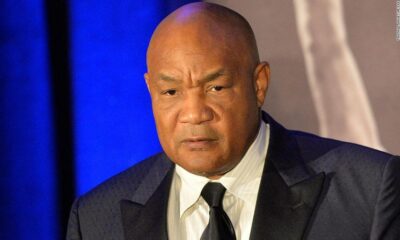
 International Sports4 days ago
International Sports4 days agoBoxing legend George Foreman dies at 76
-

 International Sports3 days ago
International Sports3 days agoRCB bring fireworks to opening night of IPL 2025
-
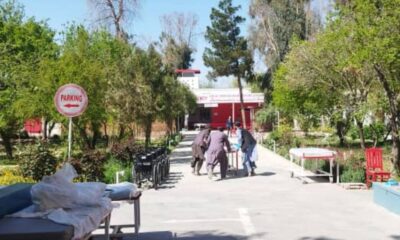
 Latest News4 days ago
Latest News4 days agoEighteen injured after dispute between two brothers in Helmand
-
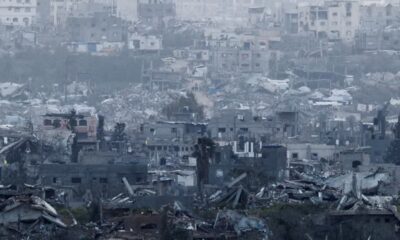
 Regional5 days ago
Regional5 days agoHamas studies US ‘bridge’ proposal for truce as Israel escalates return to war
-
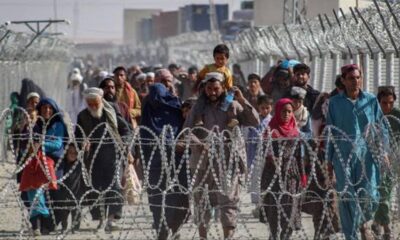
 Latest News3 days ago
Latest News3 days agoTorkham border reopens for pedestrians
-
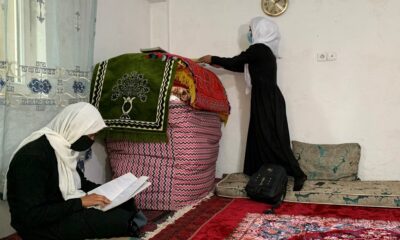
 Latest News4 days ago
Latest News4 days agoBan on girls’ education in Afghanistan will be ‘catastrophic’: UNICEF
-
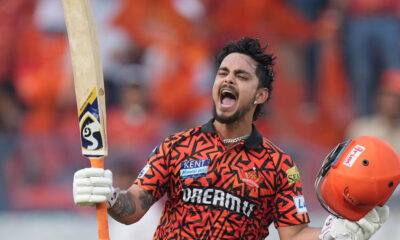
 International Sports2 days ago
International Sports2 days agoIPL 2025: Sunrisers on a batting rampage; triumph over Rajasthan Royals




